Want to Boost Your Older Loved One’s Appetite? Here’s How
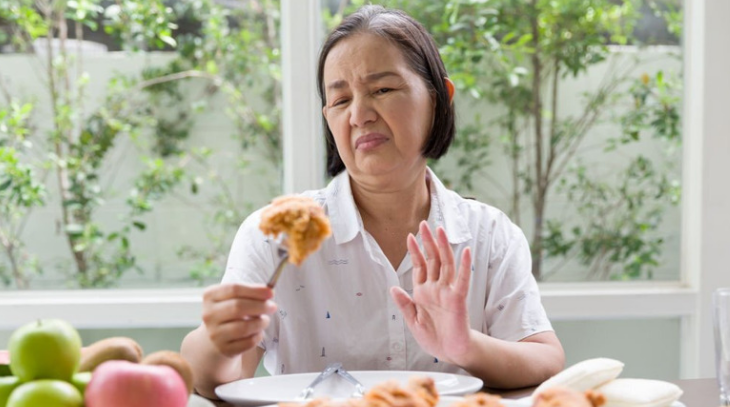
One common symptom in those starting to age is losing or reducing appetite. It can be hard for seniors to eat when they want or need it, which causes some people who are elderly not even bother with food at all anymore. It is important that those individuals eat healthy meals so they don’t go through any long-term harm that these changes might cause them later on in life.
As someone who looks after your elderly loved ones, it can be a challenge to convince them to eat enough food to nourish and encourage their bodies to function properly. But no matter how difficult it is, there are a few ways that you can get them to eat healthy, even when they don’t seem to be in the mood.
We at Serenity Senior Care understand the changes your loved one is going through and your concerns for them. We want to help in any way we can, which is why we have created this blog post to give you tips on how to get your elder loved ones to eat more food. But first, let’s know why people lose their appetite as they age.
Why Do Seniors Lose Their Appetites?
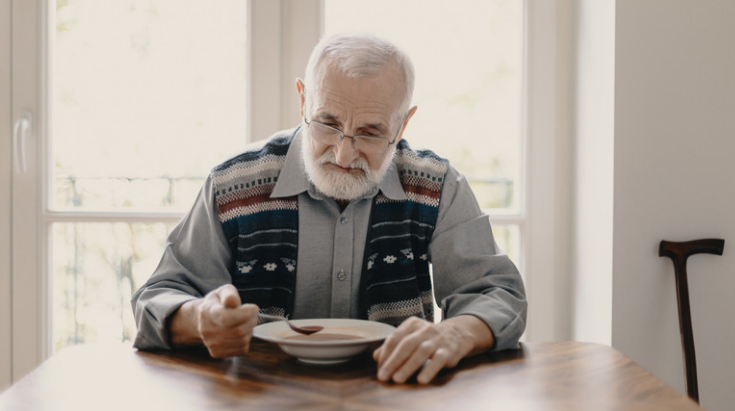
Loss of appetite is a common symptom for elderly individuals as they age and can result in other medical problems. When one has less of an appetite, it can be hard for them to eat as much and as healthy as required.
To help you understand why it happens, we will explore what types of health conditions could cause a loss of appetite in seniors and the ten common reasons why someone wouldn’t want to eat.
If your elderly loved ones have suddenly lost their appetite, it is essential to talk with their doctor. A check-up may be needed to find out if there is a medical issue causing the loss of appetite and treat it if possible.
Some serious health conditions cause changes to taste and appetite, including:
- Thyroid disorders
- Alzheimer’s and Parkinson’s disease
- Salivary gland problems
- Cancer
- Mouth and throat infections or gum disease
Medication side effects such as dry mouth and dry or irritated throat can also cause a temporary lack of appetite.
8 Reasons for Loss of Appetite in Older Adults
If a health or medication issue does not cause loss of appetite of your loved one, here are eight common reasons why an elderly might not want to eat.
1. Physical Inactivity
Physical Inactivity can cause a slump in the older individual’s appetite. As the body ages, it starts to become weaker, resulting in a lack of energy. The body is not as active and thus does not have enough glucose to fuel. It will cause them to feel less hungry and less likely to eat.
2. Dehydration
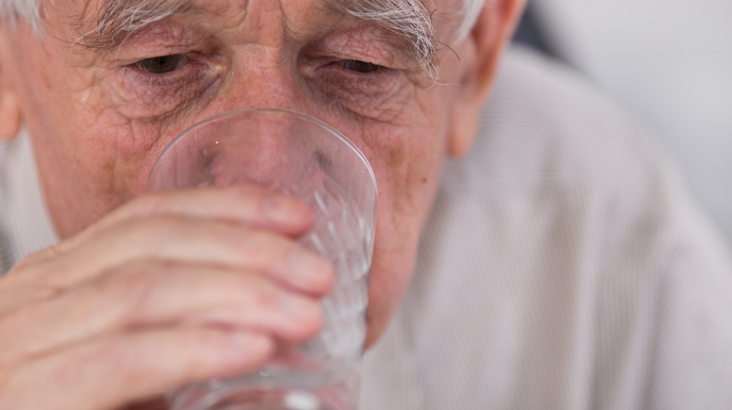
As the body gets older, it can lose its tolerance and ability to hold fluids in its tissues. It causes the person to become dehydrated more easily, which can cause them to lose their appetite. Seniors must drink plenty of water for optimal health and wellness.
3. Lack of Daily Routine
People find their daily routines as people get older. This routine could be a simple one, like eating breakfast at the same time every day. When the routine is broken or not followed, it can cause someone to lose their appetite.
4. Inability to Prepare Their Meals
As people age, they lose their abilities and strength in their hands and fingers. It causes them to have difficulty dressing and preparing their own meals.
5. Sensitivity to Smells
With age, the sense of smell can begin to fade. It can cause an individual not to want to eat certain meals because they don’t like the smell or taste of the food.
6. A Loss of Taste
As people get older, their senses start to fade, and they can lose the taste they once had. If they eat something bland, there is a good chance that they will not want to eat again.
7. Difficulty Chewing, Swallowing, or Eating On Their Own
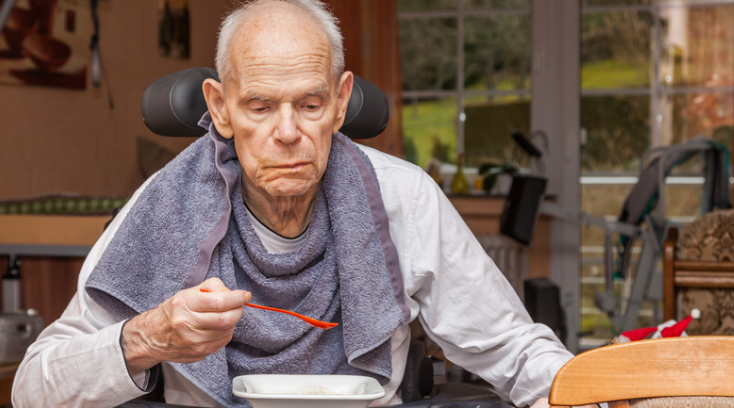
As people age, they can experience a decline in the muscles and joints of their mouth. It can cause difficulty chewing and swallowing and problems gripping utensils. Other reasons why its hard for your loved one to chew or swallow, or eat independently include:
- Dental problems – Gum disease or decay can cause the loss of teeth and lead to the inability to chew or swallow food.
- Neurological problems – Strokes, spinal cord injuries, and other neurological issues can cause muscles in the mouth to weaken or deteriorate. These issues can affect someone’s ability to chew, eat, or swallow.
- Mouth and throat infections – Some infections in the throat may cause difficulty swallowing, chewing, or breathing.
8. Loneliness or Depression
Many elderly individuals experience the loss of a spouse or close friend, which can cause them to become lonely or depressed. This, in turn, can cause them not to want to eat just because they have nobody to eat with. You must learn how to help seniors deal with anxiety and depression.
How to Increase Appetite in The Elderly?
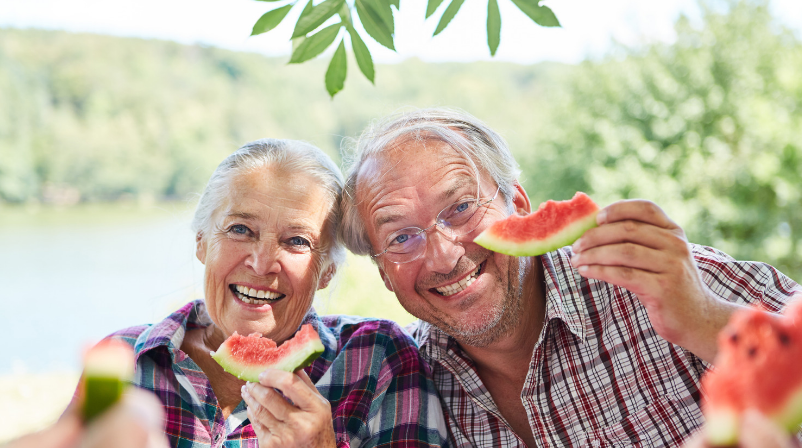
Even though your loved one has experienced some of the older health conditions or complications above, there is no reason to worry that you cannot get them to eat. At Serenity Senior Care, our goal is to help your elderly loved ones live a healthy and fulfilling life with our helpful tips below:
1. Prepare Meals That Are Easy To Eat
For those senior citizens that are having issues with chewing or swallowing, it can be hard for them to manage to eat on their own. It is best to prepare meals that are easy for the seniors to consume and chew on their own. An easy meal example would be a bowl of pasta or mashed potatoes.
2. Eat at Regular Times
Many elderly individuals enjoy having a routine during mealtimes, and this can help them want to eat more often and feel better about their health. A good time to eat is at the same time every day. An example would be eating lunch at noon every day.
3. Serve smaller portions of high nutrient foods
Senior citizens having issues eating, chewing, or swallowing can sometimes benefit from limiting the portions served. It will help them to eat smaller meals more frequently.
You can try switching to a daily routine where your senior loved one eats five small meals instead of 3 big ones.
Increase the healthy calories in those smaller servings by putting:
- Soft cheeses like mascarpone or ricotta
- Olive oil
- Dairies such as yogurt or cheese
- Low-fat meats like skinless chicken breast
- Fish like trout or salmon
- Beans and vegetables
- Nuts like almonds and walnuts
- Whole-grain foods like brown rice, quinoa, whole-wheat pasta, and corn tortillas
4. Limit the need for utensils
Many older adults have difficulty holding or gripping utensils and need a little help. Limit the use of utensils when trying to get your loved one to eat, and make sure you serve them foods that require no utensils.
Some suggestions include:
- Chicken strips or nuggets
- Meatballs
- Steamed or raw veggies like broccoli, carrots, cucumber pieces, or bell pepper strips
- Fish sticks
5. Have plenty of easy-to-eat snacks on hand
Fruits, vegetables, and nuts are good healthy snacks for elderly individuals. If a senior does not want to eat much of a meal, offer them some healthy snacks like yogurt with nuts or fruit smoothies, and this should help them stay full so that they do not become malnourished.
6. Eat with others
The elderly population is getting older, and often their family members do not want them to lose their independence. You can also get your loved one to eat more frequently by eating with others.
Wrapping It Up
We live in a world where our bodies are constantly changing, and it can be difficult for us to maintain the same tastes or styles over the years. We learn to adapt and accept this change as the years’ pass, but this adaptability is not easy for some of our older family members. If you notice your elderly loved one is losing their taste for food, you may consider some of the tips listed above and try to get your older loved one eating again.
However, if you have other obligations you need to attend to other than feeding your loved one meals, you can always obtain a Home Health Aide or Nurse to help feed them. To find a reliable one, you may want to contact a company like Serenity Senior Care. Serenity Senior Care is a Home Health Aide company that helps senior citizens with the daily activities of life. It provides for the health and well-being of seniors in the community. For more information on this service, you may call them directly at 973-338-0124.


